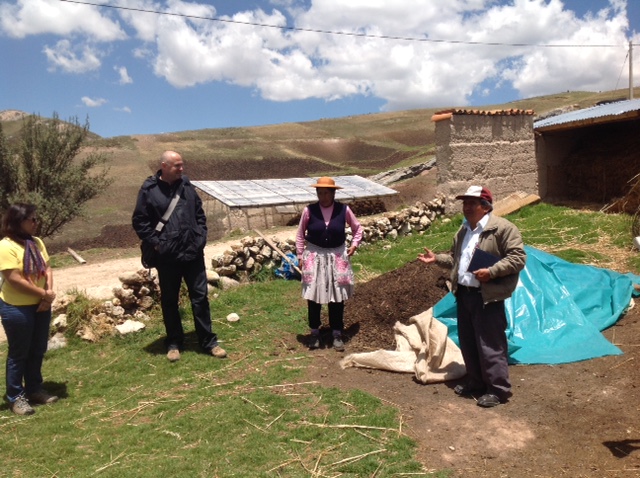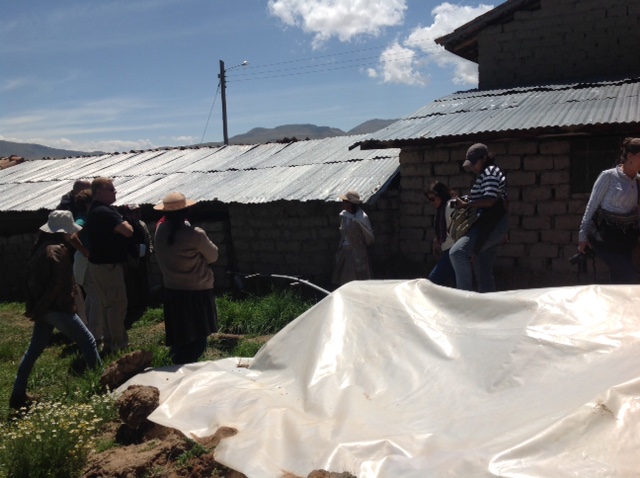By Conrado Olivera, Red Uniendo Manos Perú, Joining Hands Peru

CEDEPAS worker Crisanto and community member Feliza explain how they produce organic compost using natural and accessible materials to the region. Photo courtesy of Jed Koball.
Without a doubt, climate change is generating growing risks for the security of families from the high Andes of Peru. The frequency of extreme climatic events such as prolonged droughts, freezing spells, and floods are connected to fluctuations in water sources and loss of water harvests, affecting food security and the health of the most vulnerable populations.
Considering this situation, the non-governmental organization CEDEPAS Centro, a member organization of Red Uniendo Manos Perú, the Joining Hands Network in Peru, working with populations in extreme poverty, is looking for alternatives that will allow poor communities to adapt to environmental changes and create improved conditions of sustainability: habitable homes, domestic renewable energy sources, diversification of agricultural production, and better public policies at both the local and national government levels. In order to accomplish this, CEDEPAS Centro has launched an experimental project.
This experiment is taking place in the district of Yanacancha and San José de Quero (department of Junín), in the sub-watershed of the Cunas River, at an altitude of 11,800 – 14,800 feet above sea level, with an average temperature that ranges between 5°F at night to 70° during the day.
Sixty percent of the population of these districts lives in poverty – 20% among the most impoverished in the country. Monthly incomes average only $110. Twenty-two percent of women are illiterate. The mortality rate of children is almost 23% due to respiratory issues and more than 16% due to digestive system disorders. Forty-seven percent of children suffer from chronic malnutrition.
The Experiment
Campesino families in this zone live in a situation of poverty and marginalization. Their economy revolves around a system of subsistence production for family consumption, sharing and exchanging manual labor, and animal and agricultural production, all of which allows them to avoid monetary costs and protect themselves against ecological risks and the conventional market. The primary activity is agriculture and the raising of small animals, such as guinea pigs and fowl, on a small scale, as well as larger animals, such as cows and alpaca, in a traditional system of livestock. These communities are characterized by their communal life and solidarity, with a strong prevalence to identify themselves with their land and cultural heritage.
Spaces for dialogue at the local and provincial levels are being developed in coordination with health posts, rural families and community leaders in order to ensure that the interests of all are taken into account in decisions and public communication with local governments. As CEDEPAS Centro builds the capacities of local leaders and authorities, they are simultaneously working towards the development of public policies that will help in the creation of healthy homes.

Community members explain their methane gas bio-generator to visiting guests from the U.S. This simple technology converts cow, sheep, and guinea pig manure into methane gas that can be used for cooking, while also preventing such gases from naturally entering the atmosphere and further contributing to greenhouse gas affects.
This initiative applies a re-design for each family home, incorporating the use of new technologies that take advantage of renewable energies with greater efficiency: solar water heaters, solar panels, heating chambers, greenhouses for the production of vegetables, and smoke-reducing stoves among other simple technologies for the home. These technologies improve the habitability of the home, and the production of diverse vegetables helps strengthen food security and meet nutritional needs.
With the objective of diminishing the degradation of agricultural soils and deforestation in these communities, a reforestation initiative was started using native and exotic tree species on family properties. This is accompanied by the training and formation of community leaders in the management of the trees.
For the protection of health, parents and children are being trained in the prevention of intestinal and respiratory illnesses, which are often associated with family hygiene habits.
Lastly, this initiative prioritizes the creation of healthy homes within the municipal ¨participatory budget.¨
Searching for Sustainability
The sustainability of this initiative is based on four dimensions of development: Political-Institutional, Social, Economic, and Environmental.
At the Political-Institutional level, public institutions (local government, Ministry of Health, campesino organizations) are involved by implementing policies that favor the most vulnerable populations and by ensuring that this initiative continues in the following years. For example, a plan of incentives to improve Municipal management ensures the procurement of health services for primary level care, as well as for basic education.
The environmental aspect is oriented towards the more efficient use of local resources by taking advantage of renewable energies in homes. This is part of a process for producing cleaner and healthier food.
The social aspect is understood through the harmonious participation of all family members, with a focus on strengthening the role of women and on the improvement of education and health. Community organizers are trained in: installation and management of technologies, technological management of animals and agricultural products, and health care of people. Knowledge is shared among families.
In the economic dimension, a focus is placed on improving the family economy in relation to its environment through the development of farming practices: cultivation of organic vegetables, responsible management of animals, and recycling of organic waste. These practices constitute a system of diversified production of food, the excess of which can be sold at market.
The rural farming communities of Peru understand that the climate is changing faster than their capacity to avoid risks. Rains, freezes, and other extreme climatic events are unpredictable, and these factors have a negative impact on their way of life.
The experiment of Yanacancha is designed to contribute to the mitigation of climate change in the high Andean rural areas through the commitment of the population, authorities and the use of technologies in the care of the environment.
![]() You may freely reuse and distribute this article in its entirety for non-commercial purposes in any medium. Please include author attribution, photography credits, and a link to the original article. This work is licensed under a Creative Commons Attribution-NonCommercial-NoDeratives 4.0 International License.
You may freely reuse and distribute this article in its entirety for non-commercial purposes in any medium. Please include author attribution, photography credits, and a link to the original article. This work is licensed under a Creative Commons Attribution-NonCommercial-NoDeratives 4.0 International License.